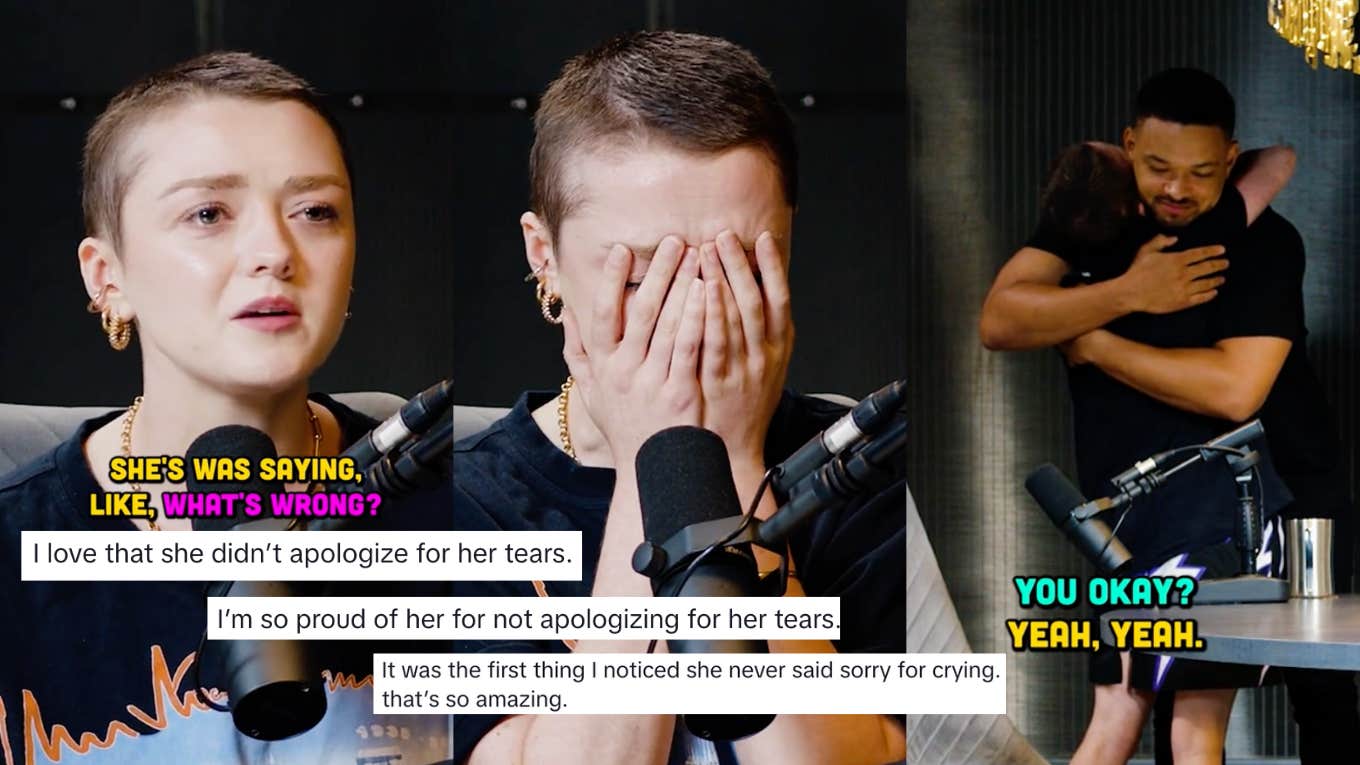Why 'Game Of Thrones' Star Maisie Williams' Being Unapologetically Emotional Has The Internet Talking
It never seemed to even occur to Williams to apologize for becoming tearful, and many found it deeply freeing.
 Steven Bartlett / TikTok
Steven Bartlett / TikTok Actor Maisie Williams is among the most successful performers of her generation, but like so many artists, she walked an incredibly difficult road to get there.
A clip of Williams opening up about her difficult childhood to podcaster Steven Bartlett has recently resurfaced, and for many viewers this time around, it's what she didn't say during the interview that has left them feeling seen and deeply moved.
'Game of Thrones' star Maisie Williams being unapologetically emotional about her past has many online saying 'thank you.'
As the woman behind 'Game of Thrones' Arya Stark, Maisie Williams has entered into the pantheon of film and television legends. But as she revealed to Bartlett on his podcast "The Diary of a CEO" in September 2022, Williams had to triumph over an incredibly difficult past to get there.
During the sit-down, Williams revealed a bit about the heartbreaking trauma she endured as a child with her abusive father, whom Williams says "indoctrinated" her against her mother in a situation she likened to a cult.
Williams described not fully realizing the abuse she was suffering until a teacher began 'asking the right questions.'
Williams described to Bartlett how confusing her childhood was, saying "I think a lot the traumatic things that were happening I didn't realize that they were wrong, but I knew that I would look around at other kids and be like, 'Why don't they seem to understand this, like, pain or dread or fear?'"
It wasn't until a teacher got involved that she truly began to understand that things were awry. Williams recounted how she was taken aside to the teacher's lounge of her school, where she was asked if she'd eaten any breakfast that day. "I said, no, and she said, oh, why not? And I said, we just don't have any breakfast," going on to confess that she rarely ever ate before school.
Remembering these harrowing days made Williams well up until she was overcome with emotion — so much so that Bartlett got up from his seat to give Williams a hug and comfort her.
After regaining some composure, Williams soldiered on to continue making what she called the "important" point of her story: That despite having "so many people who loved and cared about me so much," no one had found a way to "ask the right questions" to allow a child to open up about abuse she doesn't fully understand.
People were deeply moved by her story, but for many, it was Williams' refusal to apologize for becoming emotional that resonated most.
We've all heard it a million times — the first step to healing from trauma is to talk about it, and in Williams' case, her teachers asking questions was indeed her first escape hatch.
"It was the first time that... all of the doors were sort of open," she told Bartlett, "and all of these things that we were experiencing were out on the table."
Williams went on to say it allowed her to get past the thought that there must be "something inherently wrong" with her that was causing the harrowing situations she was enduring, and in the comments of Bartlett's TikTok video, several people identified deeply with Williams' experience — quite literally in some cases, like a woman who wrote that "my mean maths teacher [asking] me the right questions and saved my life."
But for others, it wasn't so much the details of the story that resonated but rather Maisie Williams being unapologetically emotional about what happened to her.
"I’m so proud of her for not apologizing for her tears," one woman wrote. "While healing, I was told don’t apologize for your tears," another person commented. "Just thank the person there with you for their patience and understanding."
I have found myself even doing this with my own therapist — apologizing for essentially putting her through what I'm paying her to do. It's such a standard and accepted part of our culture to try to atone for having emotions that some confessed to being surprised that Williams didn't do it.
"I automatically say sorry if I start crying," one person wrote. "I never thought to try and stop that."
But thanking Williams for being unapologetic about the pain of childhood trauma she bears no responsibility for is so against the cultural norms many of us have internalized it feels sort of revolutionary. And that should change, especially since, as another commenter pointed out, the whole reason many of us do it in the first place is because we were taught, erroneously, that crying is bad or wrong as children.
No doubt, Williams telling her story at all will help scores of people confront their own trauma. But the quiet strength she showed in simply letting her emotions be and not trying to make up for them might be the true impact of her telling her story. One commenter even said that watching Williams not reflexively apologize for crying "changed my trajectory." Another said it "rewired my brain a bit."
Here's hoping we can all internalize this lesson in our own lives, whether we're the ones showing emotion or the ones showing up for someone else. Because, as one commenter wrote, "it’s a privilege to hold someone’s grief." No apologies necessary.
John Sundholm is a news and entertainment writer who covers pop culture, social justice and human interest topics.
